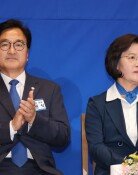Clinton and Obama Oppose Korea-U.S. FTA
Clinton and Obama Oppose Korea-U.S. FTA
Posted February. 16, 2008 04:02,
The U.S. presidential race for party nominations is drawing to a close as a Republican presidential candidate was virtually confirmed and two Democrats are engaged in a neck-and-neck battle for nomination. The potential candidates proposed policies on Korea are attracting much attention from Koreans.
Sen. John McCain, who virtually grasped the Republican Party nomination, is expected to take over President Bushs hard power diplomacy based on the nations strong military. If North Korea continues to delay its report on nuclear programs, the possibility that the U.S. would increase its pressure on the communist country cannot be ruled out.
By contrast, Senator Hillary Clinton and Senator Barack Obama, leading democratic candidates for the November U.S. presidential election, stress a peaceful resolution to the North Koreas nuclear issue through diplomatic channels. Both candidates argue that the major reason for rising tension on the Korean Peninsula lies in U.S. President George W. Bushs alienation and hostile policy against North Korea before North Korea carried out a nuclear test in Oct. 2006.
The Dong-A Ilbo compared the three candidates policies on the Korea-related issues disclosed through their campaign websites, contributions to the media and archives of the U.S. Congress.
North Korean Nuclear Weapons Program
All three candidates argue that the communist countrys possession of the nuclear weapons cannot be tolerated, to bring peace and security on the Korean Peninsula and help North Korea enter the international community.
Obama and Clinton, however, point out that the next government should not repeat the mistake made by the Bush administrations unilateral and hard-line policy on the communist regime following the suspicion over the uranium enrichment program (UEP) in North Korea in October 2002.
Based on this statement, it is possible to predict that the current six-party talks would remain to resolve the nuclear issue of North Korea through diplomacy if a democratic candidate wins the presidential election.
In his contribution to the July-August 2007 issue of "Foreign Affairs, Obama said, In confronting these threats, I will not take the military option off the table. But our first measure must be sustained, direct, and aggressive diplomacy -- the kind that the Bush administration has been unable and unwilling to use. He also added his intention to meet with North Korean leader Kim Jong Il.
In another written statement to the U.S. Senate Foreign Relations Committee, Obama made clear his belief on making the Korean Peninsula free of nuclear weapons, saying, I have no illusions about North Korea, and we must be firm and unyielding in our commitment to a non-nuclear Korean Peninsula.
Supporting peaceful resolution through dialogue, Clinton also stated that, The U.S. should make efforts to reduce nuclear arsenals, along with the Russian government, in an effort to reconfirm our will of denuclearization. Such initiative can prevent nuclear arms and materials form spreading further, and serve as an effective tool to pressure North Korea.
Sen. McCain criticized North Koreas totalitarianism on his website by pointing out, It still remains unclear whether the regime would fully give up and disclose its nuclear materials and facilities.
"Future talks must take into account North Koreas ballistic missile programs, its abduction of Japanese citizens, and its support for terrorism and proliferation, said McCain in the November-December 2007 issue of Foreign Affairs.
The Future of the Korea-U.S. Alliance
McCain argues that South Korea and the U.S. need to strengthen their relations centering on the economy and security. The most required thing to that end is, he said, the consistent engagement of the U.S., making it clear that he would pursue military and security measures by maintaining the U.S. Armed Forces in South Korea.
Obama stressed the importance of value alliance, saying on Feb. 11 that we need to work with South Korea on a common vision for the alliance to meet the challenges of the 21st century, not only those on the Korean Peninsula but in the region and beyond."
In addition, he said, In order to achieve the multilateral cooperation in the Northeast Asia, it needs to expand and strengthen the bilateral relationship between South Korea and the U.S. and establish a multilateral framework of security cooperation that goes beyond the six-party talks, an ad-hoc diplomatic channel.
Clinton also argues for the need to build a strong security tie in order to improve regional security and cooperation. But, she didnt directly mention strengthening the bilateral relationship with South Korea, while clearly mentioning other countries including China, Japan and Australia.
KORUS FTA
Clinton and Obama have repeatedly expressed their reservation about the free trade agreement between South Korea and the U.S.
Clinton, who is backed by the U.S. auto union, reiterated her opposition to the deal in several addresses, citing South Koreas automobile exports to the U.S.
Obama also expressed on Feb. 11 his discontent over the key standards of industries and sectors such as autos, rice, and beef, saying The Korea-U.S. FTA deal does not meet the "standard" of reciprocity.
In contrast, McCain said that he aggressively supports the FTA, stating that, The potential of the Korea-U.S. FTA should be fully achieved.
triplets@donga.com







